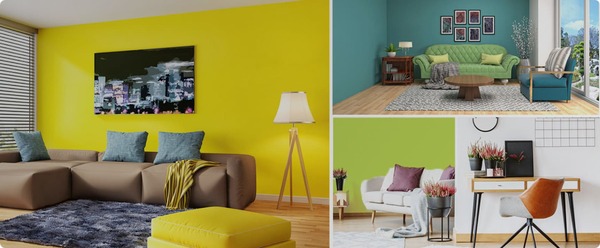
Colour psychology is the study of how colours affect our emotions, behaviours, and well-being. Different colours can evoke a wide range of emotions and moods, and when used thoughtfully, they can have a profound impact on your home's interior and exterior. Let's explore how you can use colour to your advantage in various areas of your house.

Your home's entrance is the first thing guests see, and it sets the tone for what's inside. For a warm and inviting feel, consider using shades of green or earthy tones. Green symbolises growth and renewal, making it an excellent choice for front doors and entryways.

In the living room, where you unwind and entertain, consider soft and calming colours. Blues and cool greys are perfect for creating a peaceful atmosphere. You can also incorporate warm neutrals like beige and taupe to add a touch of coziness.

The kitchen is often the heart of the home, where you need energy and inspiration. Bright, warm colours like red and yellow are known to stimulate the appetite and creativity. These hues can be used for accent walls, backsplashes, or kitchen accessories.

In the bedroom, tranquillity and restfulness are key. Opt for soothing colours like soft blues, gentle lavenders, or calming greens. These shades promote relaxation and a better night's sleep.

Bathrooms should be clean and serene. Whites, light blues, and soft greens can create an atmosphere of cleanliness and relaxation. Consider incorporating these colours for tiles, paint, and décor.

When it comes to the exterior of your home, curb appeal matters. Neutral colours like greys, beiges, or even soft pastels can make your home look inviting and timeless. Bold front doors in colours like navy, red, or deep green can add a touch of personality.
When decorating a room, it's essential to balance your colour choices. A common guideline is the 60-30-10 rule. Use a dominant colour for 60% of the room, a secondary colour for 30%, and an accent colour for the remaining 10%. This creates harmony and avoids overwhelming your senses.

Each colour carries its unique psychological impact:
Red can stimulate energy, passion, and excitement.
Blue instils calmness, trust, and productivity.
Yellow brings in optimism, creativity, and warmth.
Green represents growth, health, and relaxation.
Purple embodies luxury, spirituality, and creativity.
Orange evokes enthusiasm, energy, and fun.
The power of colour psychology in home decorating is a remarkable tool for creating a space that not only looks beautiful but also feels comfortable and matches your personality. By understanding the emotional impact of colours and incorporating them into your interior and exterior design, you can transform your house into a sanctuary that suits your lifestyle and preferences.
Whether you're aiming for a cozy living room, an inviting entryway, a functional kitchen, or a restful bedroom, the colours you choose can make all the difference. So, let your creativity flow, and let the magic of colour psychology enhance your home's beauty and comfort. Happy decorating!